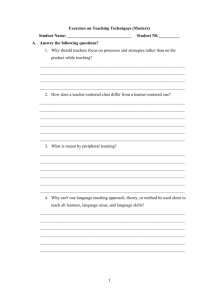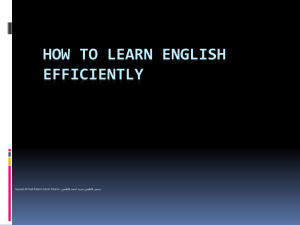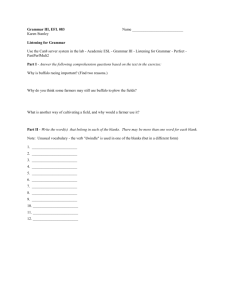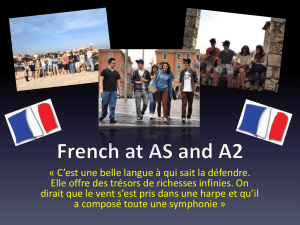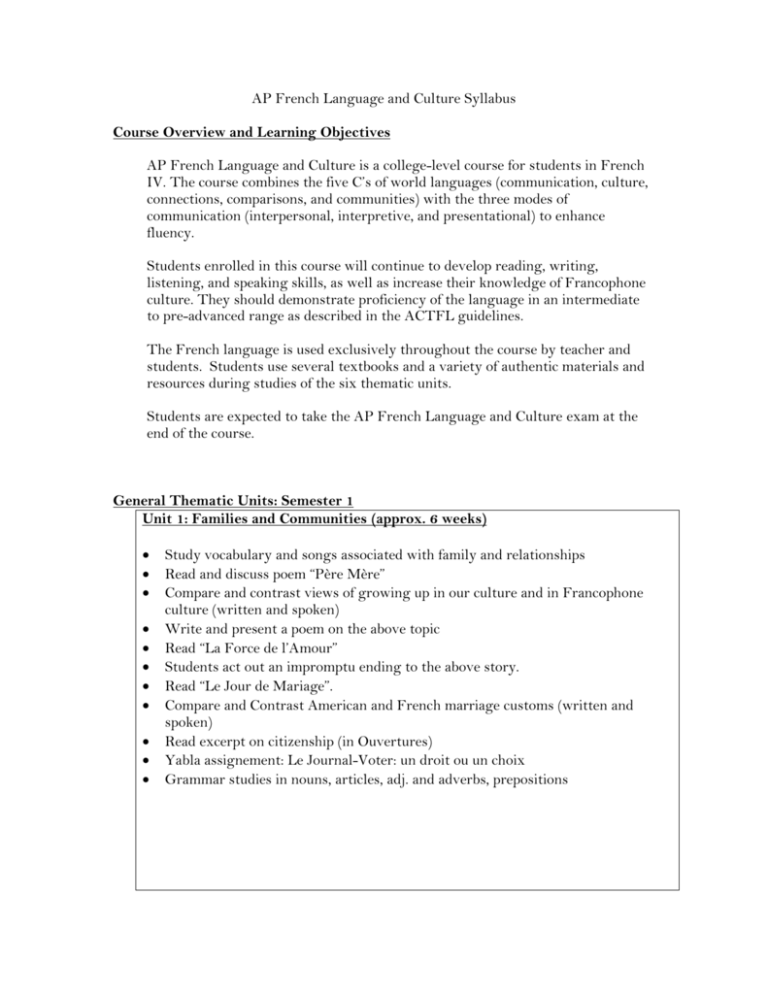
AP French Language and Culture Syllabus
Course Overview and Learning Objectives
AP French Language and Culture is a college-level course for students in French
IV. The course combines the five C’s of world languages (communication, culture,
connections, comparisons, and communities) with the three modes of
communication (interpersonal, interpretive, and presentational) to enhance
fluency.
Students enrolled in this course will continue to develop reading, writing,
listening, and speaking skills, as well as increase their knowledge of Francophone
culture. They should demonstrate proficiency of the language in an intermediate
to pre-advanced range as described in the ACTFL guidelines.
The French language is used exclusively throughout the course by teacher and
students. Students use several textbooks and a variety of authentic materials and
resources during studies of the six thematic units.
Students are expected to take the AP French Language and Culture exam at the
end of the course.
General Thematic Units: Semester 1
Unit 1: Families and Communities (approx. 6 weeks)
Study vocabulary and songs associated with family and relationships
Read and discuss poem “Père Mère”
Compare and contrast views of growing up in our culture and in Francophone
culture (written and spoken)
Write and present a poem on the above topic
Read “La Force de l’Amour”
Students act out an impromptu ending to the above story.
Read “Le Jour de Mariage”.
Compare and Contrast American and French marriage customs (written and
spoken)
Read excerpt on citizenship (in Ouvertures)
Yabla assignement: Le Journal-Voter: un droit ou un choix
Grammar studies in nouns, articles, adj. and adverbs, prepositions
Unit 2: Contemporary Life (approx. 8 weeks)
Study vocabulary and songs associated with schools, sports, holidays, and travel
Research and present in groups different aspects of French education system
Read “Allô maman, j’ai décroché mon bac (www.ouest-france.fr)
Write a comparison to the bac and American high school graduation.
Debate as a class, for or against, the system of the bac.
Reading and writing activities for Yabla, “Le Journal- Publicité anti-calories
Create and present a “publicité.”
Read excerpt on housing.
Research to create a realistic floor plan on a poster, of a house or apartment in
France to buy or rent. Include price
Read. “Le Chandail de Hockey,” and discuss and write a reaction to the story.
Read excerpt about holidays in France
Choose a holiday to present in oral and written form
Create and present a dialogue : “Où est-ce qu’on voyage?”
Grammar : Study of verb tenses.
Unit 3: Science and Technology (approx. 4 weeks)
Study vocabulary and songs associated with technology and inventions
Read and discuss excerpt: “Advantages and disadvantages of the cell phone.”
Read and discuss “un appareil qui retranscrit du texte en Braille.”
Yabla, « Le Journal- Opérateurs virtuels de portables »
Group written and presentational projects : timelines of science or technology
advances in France
Read and respond in writing to Pris en flag de fraude par sms
Listening activity: “Agriculture verticale- Terra Sphere”
Grammar: Si clauses and associated tenses
Deuxieme Semestre (Page suivante)
Unit 4: Personal and Public Identities (approx. 7 weeks)
Study vocabulary and songs associated with immigration
Read “La Dernière Classe” and respond in writing
Watch Au Revoir Les Enfants and compare the two main characters with class
discussion and in writing.
Study, analyze , discuss, and participate in various activities regarding
multiculturalism, assimilation, values and beliefs through Le Café des Rêves
Group presentation of a sequel to Café des Rêves.
Class debate and listening activities on “Grand Lille TV- Sondage: le voile integral”
and “Alsace 20- Arlette Grosskost et la burqa” (Yabla)
Grammar: Interrogatives and negatives
Unit 5: Global Challenges (approx. 4 weeks)
Study vocabulary and songs associated with health, nature and the environment.
Read, illustrate and discuss L’Homme qui plantait les arbres.
Watch film L’Homme qui plantait les arbres and write about a person who has
made a difference.
Listening and writing activities (Yabla) Télé Miroir: Un kit de survie offert aux
SDF
Study and sing the song « Aux Arbres Citoyens » by Yannick Noah
Listening activity (Yabla) Alsace 20- Pourquoi le bio est-il important
Make a healthy dish, sharing recipe, ingredients, caloric content, etc.
Read and discuss Medicins San Frontières (Sur le Vif) excerpt
Read and discuss “Liberté” (Paul Éluard)
Write a poem entitled “La Paix.”
Grammar: Pronouns
Unit 6: Beauty and Aesthetics (Approx. 7 weeks)
Study vocabulary and songs associated with the arts.
Read about and express preferences for current artists (Imaginez)
Read and perform Le Fantome de L’Opéra (or excerpt of Les Misérables)
Read and analyze Il Pleure dans Mon Coeur (Paul Verlaine)
Read and discuss excerpt of Candide.
Listening activity: Le Petit Prince
Watch film Les Parapluies de Cherbourg. Write journal entries as if you were
Geneviève.
Read excerpt of Moderato Cantabile and make predictions for l’enfant
AP Practice exercises
Teaching Strategies
Use of only the French language - by the teacher and the students – enhances
the level of all four skills (reading, writing, listening, and speaking) in everyday
learning. There is an emphasis on daily communication with a paired partner, in small
groups, or a whole class presentation. This can be in the form of activities, peer reviews,
and dialogues. Students receive an informal grade twice a month on communicating in
French. Two to three times a week, other grades are taken for each student. The
following is a description of those activities and assessments in the four skills.
Speaking Proficiency
Speaking practice is required everyday in some type of form. I will use the
thematic unit “Families and Communities,” to demonstrate examples of speaking
activities within one thematic unit.
The study of vocabulary would require students to ask and answer questions
using the vocabulary, sing the corresponding song(s), and to participate in discussions
about family and relationships. After reading the poem, “Père Mère, there are oral
questions which lead to discussion and often debates on growing up in America and
France. Students then do “une orale” where they present their views of growing up to
an audience (in small groups first, then to me). Presentations of the poem that students
write are done in small groups and generate discussions. When contrasting French and
American wedding customs, students perform and narrate a mock wedding from each
culture. The Yabla (or various other internet assignments) are meant to enhance all four
skills, thus this particular example (“Voter: un droit ou un choix”) will generate a class
vote and then a debate on voters’ rights and choices.
Grammar studies are mainly done as homework assignments , however, we
always discuss and check these activities in French together. Students must ask their
questions in French, and I answer and explain exclusively in French.
We have no language labs, but frequently use DVRs and a portable Mac lab to
record student speaking samples, grade them, and create classroom based listening
activities as well. DVRs are also used for AP exam speaking practice.
In the bibliography, there are example websites students use to respond in
writing and/or spoken French. The articles or excerpts from the websites differ
according to current events, and which thematic unit we are studying.
Listening Proficiency
This class is conducted exclusively in French, and the students speak French
outside of the class with me and each other as well. For a summer assignment, students
find a French song that relates to one of the six themes, and burn the song to a CD.
Songs (from this assignment, from Yabla and other internet sources, and from AP
workshops) are sung, listened to for comprehension and analysis, and are sometimes
memorized. Students download the music to their ipods for practice and fun.
Other listening activities include, but are not limited to, comprehension
questions and prompts, internet listening excerpts, interviews among students,
discussions, “verbe du jour” quizzes, Yabla activities, dialogues, role-playing, debates,
performances of literary works, and structured practices for the AP exam.
Reading Proficiency
Students read from a variety of materials on a weekly basis: various literary
excerpts from different Francophone regions, authentic newspaper and magazine
articles (some from the Internet), and Yabla topics. Responding to the readings is
usually done in written form first (answering multiple choice and true/false questions
while justifying the answers, answering short answer questions with justification, or
writing responses to a reading in their writing journals). These responses are then used
for discussion/debate activities.
Periodically throughout the year, there is structured practice for the reading
section of the AP exam.
Writing Proficiency
Writing is required at least twice per week. This includes using thematic
vocabulary to the fullest extent. Students are encouraged to write “quantité et qualité.”
They write reactions to literary works, film clips, and movies. These are usually timed
writings in class. Every two weeks, students are given a take home writing assignment
with a rubric of expectations that I use to grade. I underline errors and make a list of
most common errors to share with the class. Students then correct their writing
assignment, and they hand it back in.
During the second semester, journal writings include the current thematic unit
concepts with previous AP style writing questions. These writings are timed in class,
and take place at least twice a week.
Other writings include reactions to Internet and magazine articles, movie clips
and movies, dictées, reactions to Yabla, poetry, and skit writing.
Students practice assessment of writing for the AP exam through peer revision,
self-correction, and studying samples and scoring from former tests.
Course Materials
Lenard, Yvone, Trésors du Temps McGraw-Hill, Glencoe, 2005
Renaud, Simone, and Van Hooff, Dominique. En Bonne Forme, Houghton
Mifflin Co., 2007
Supplementary Textbooks and Resources
Mitschke, Cherie. Imaginez Vista Higher Learning, 2008
Blood, Elizabeth, and Mobarek, Yasmina. Intrigue Pearson Prentice Hall, 2007
Siskin, H. Jay, and Field, Thomas, and Storme, Julie. Overtures John Wilet and
Sons, 2006
Moore, Olin, and Meiden, Walter. Onze Contes Houghton Mifflin, 1957
Williams, Ann, and Grace, Carmen, and Roche, Christian, Bien Vu, Bien Dit
McGraw-Hill, 2008
Coursaget, Cathrine, and Myers, Micheline. Breaking the French Barrier John
Connor, 2007
Coffman Crocker, Mary. Schaum’s Outline of French Grammar McGraw-Hill,
1999
Ladd, Richard, and Girard, Colette. AP French: A Guide for French Language
and Culture Course Addison-Wesley, 2011.
Jarausch, Hannelore and Tufts, Clare. Sur le Vif Thomson Heinle, 2006
Hinton, Nigel. Le Café des Rêves, BBC Education
Yabla progam and United Streaming program- purchased through our district
The French Review – from my membership in AATF
AP Central Electronic Discussion Group- many current website source ideas
come from these professionals.
Released AP exams- 1998
Select Internet sources for all skills:
o These are always changing and being updated, but examples are:
www.nrj.fr/radio
www.virginradio.fr
www.rfm.fr
La Baguette – Local French restaurant where students go for meetings to
Speak French and socialize with native speakers and other French students.

